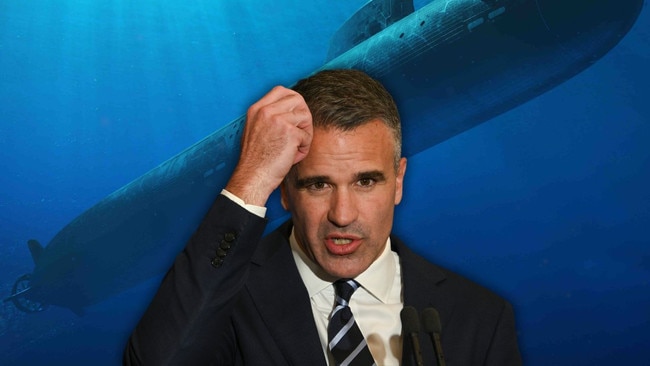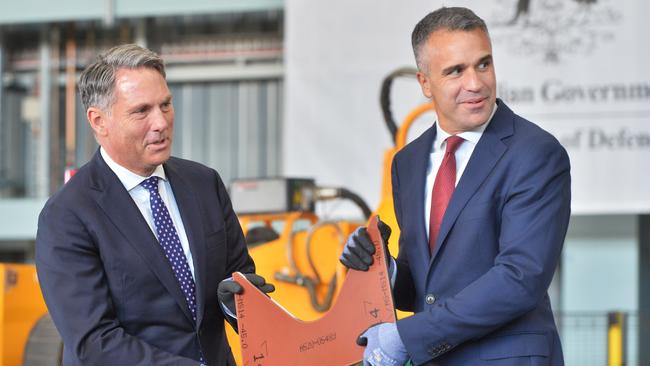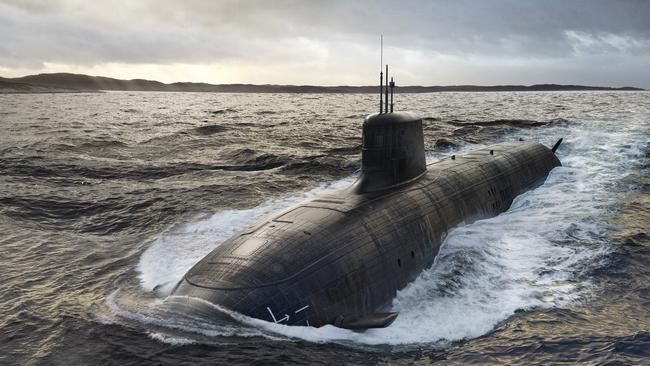What we’ve failed to understand about the AUKUS nuclear submarine project
He’s the Premier bearing most responsibility for it, but Peter Malinauskas warns the country has not come to grips with the complex reality of becoming a nuclear-powered submarine nation.

In an interview with Inquirer, Malinauskas says turning Australia into a nuclear-powered submarine nation represents an unprecedented whole-of-nation challenge but he delivers a warning – to this stage the country has not come to grips with “the weight or the complexity of the task”.
Australia has never faced a challenge of this dimension before – and time is running down.
Malinauskas, the Labor Premier of South Australia since March 2022, has been overseeing responsibility for construction of the shipyard at Osborne in Adelaide and planning for joint UK-Australia SSN AUKUS submarines to be commissioned in the late 2030s and early 2040s. The related arm of AUKUS – a three nation agreement – is the acquisition by Australia of three Virginia-class submarines from the US.
“AUKUS is not just a big project,” Malinauskas said. “It is exceptionally complicated. It will require not just a raw intelligence but acute skills. For our interests to be realised we need the whole nation to be putting into the effort, otherwise we will compromise our ability to meet the very aggressive timelines we have in front of us.
“There is no more complex undertaking on the planet than building a nuclear submarine. And I don’t think the rest of the country is necessarily attuned to the scope of this task. We need to change our thinking about AUKUS and what it means for Australia. We need to think of AUKUS as placing a demand on virtually every agency you can think of – housing, education, logistics, transport, engineering, training and skills. It’s a cross-government effort, an all-in effort.

“The benefits are as tangible and real in Sydney, Melbourne and Brisbane as much as they are in Adelaide. This goes to the great challenge for the Australian economy – we have to improve its complexity – that is how we deliver more productive labour, higher wages and more secure jobs. Nuclear subs are not just the apex predator in defence capacity, they are the apex of the industrial complexity charts. This is the ultimate and the skills will acquire on this journey will aid many other industries.”
For Malinauskas, the project demands both national vision and practical implementation. He has no time for much of the fractured debate about whether AUKUS might or might not succeed. “I hear a lot of people talk about the need for Option B,” Malinauskas said. “Well, we are at the point now where we have Option A and there is nothing else. We have got to start behaving like this. There is no Option B.” He warned that AUKUS critics are being left behind by the practical reality.
“What I see is a debate in parts of the country about the merits of AUKUS, when the task rather is to start gearing up to deliver AUKUS. And, frankly, that’s a mentality we need to change pretty quickly.” He said the mistake critics make is to think Australia has an alternative option – for example, buying more US Virginia class boats – instead of the joint build with the British in the UK and Adelaide. “The world has moved on,” he said. ”There is no submarine manufacturing yard anywhere in the world that isn’t operating at full capacity and struggling to meet the demands of its own nation.”
In short, Australia was fortunate to seize a window of opportunity with the US and UK by locking into a three-way agreement with the US and UK for purchase and construction of nuclear-powered subs given the rising strategic risks and submarine demand stretched to the limit.
In the interview, Malinauskas focused on four themes – that AUKUS must be seen as a sovereign strategic opportunity in the national interest; that any loss of nerve and making yet another change to submarine policy would be untenable; that the notion of AUKUS as an exclusive SA industrial venture is completely misguided with the eastern state economies underdone in tapping into its economic benefits; and that strong policy co-ordination and leadership at the national level is fundamental to deliver success.
“Let’s be frank about things,” Malinauskas said. “The AUKUS program is like the fourth iteration of submarine policy. When the Abbott government committed to the Japanese option there was uproar in South Australia because it was seen as a lost opportunity to create a demand for labour after the demise of Holden and the car industry. This framed submarine manufacturing as an industrial policy, not a defence policy.
“But that doesn’t accord with our present situation. AUKUS is an investment in the nation’s sovereignty. The preservation of Australia’s sovereignty now requires a submarine and shipbuilding capacity for this country as provided by AUKUS. This is necessary for our economy and our defence posture. Most Australians are well aware the circumstances of our region today are fundamentally different to when Paul Keating was prime minister.”
Malinauskas did not criticise the Labor Party. The reality, however, is that much of Labor’s support for AUKUS focuses on the jobs it creates. While important, this won’t ultimately work in political terms. AUKUS is a defence policy revolution. This is how Malinauskas champions the policy. Unless Labor can make the political case in strategic/defence terms it will finish up in trouble.
He puts AUKUS firmly in Labor’s historical frame: “We keep coming back to the need for an ADF capable of defending our interests. That is not the case today. As it stands now, the ADF is not equipped to the extent required to be reasonably able to defend ourselves. The AUKUS policy sits very well with the Labor Party of Curtin, Chifley, Hawke and Kim Beazley when we invested in the capability to defend ourselves.”
AUKUS vests Malinauskas with a national perspective and he operates as a national policy advocate. He says AUKUS demands “an entire new workforce”. Change at the margins won’t work. A strong immigration intake is non-negotiable. He appeals to both Anthony Albanese and Peter Dutton to ensure skilled migrant workers arrive in numbers. He warns against misdiagnosing the market, saying: “Australia doesn’t have an immigration crisis, it has a housing supply crisis.” The priority must be expanding housing supply to avoid “a counter-productive debate over immigration”.
He warns against damage to the international student intake: “Whilst I understand what there’re doing in a short-term context, it would be disastrous for the country if we see a curtailment in international students and skilled migration in the long term. For AUKUS, that’s a material threat.” Malinauskas said international students are critical to the financial strength of the universities and that is tied to their R&D performance.
“AUKUS is going to hoover up the domestic skills we have available now,” he said. “I look at it in the South Australian context. We’re building roads, bridges, hospitals, technical colleagues and schools and AUKUS needs these skills as well.”
The worst kept secret is that vital sections of the Canberra system are not geared to AUKUS in the fashion that Malinauskas advocates. He praises Prime Minister Anthony Albanese and Defence Minister Richard Marles for the commitments they have made.
He said of Albanese: “I think his commitment is absolute. This is a Labor Prime Minister with a background in the left of the party who walked into a national conference and backed AUKUS. I don’t think he did that for political reasons. I think he is aware the times demand a strategic investment in a nuclear capability.” He praised Marles for his strong support and said he “gets” the AUKUS project.

But Malinauskas then said: “What I would advocate is that every other level of the government and other governments around the country of all political persuasions get behind this project. Now is the time to apply urgency to the AUKUS effort to show that (a) we are capable of this as a country and (b) because we will live to regret this if we don’t.
“In the eastern states, I worry they see this as a South Australian project, rather than a national endeavour. Every jurisdiction needs to turn its mind to the size of the AUKUS opportunity for them.”
Malinauskas said he had an excellent relationship with the Australian Submarine Agency, established by the federal government from July 2023 under Vice-Admiral Jonathan Mead to construct, deliver and sustain the conventionally-armed, nuclear propulsion, submarine capability.
But he kept returning to his theme: “I would be an advocate for gearing up the ASA or any such body with overarching responsibility for AUKUS to have as much power and remit as possible including with other critical areas of government policy.”
While Albanese and Marles are invested in ministerial commitment, the concept of AUKUS as a whole-of-government project and priority is not reflected in other sections of the cabinet and is missing in some of the decisive policy departments.
During his visits to the US and UK, Malinauskas became deeply aware of the technical and cultural standing in which their submarine programs are held, saying recently that “they are seen as a true national enterprise”, the point being Australia has got a long way to travel before it sees AUKUS as “a defining national project” and “as fundamental as health or education or any other core public responsibility”.
‘The economics of civil nuclear power aren’t just dubious, as things stand today they’re very bad.’
South Australia’s defence sector currently employs more than 14,000 workers and it will need to add 15,000 more in defence and associated industries by the 2040s. There is a new emphasis on technical colleagues, partnership with industrial firms, TAFE enrolments aligned to the defence industry and collaboration between SA and overseas universities on nuclear education.
Seen from school days onwards as a natural leader, Malinauskas became state secretary of the Shop, Distributive and Allied Employees union, benefited from having current Trade Minister Don Farrell as a mentor, became a prominent figure in the ALP right wing, entered the Legislative Council in 2015, subsequently won election to the lower house, was elected Labor leader in 2018 and four years later became premier.
Long seen as a support of nuclear power, Malinauskas clarified his views during the interview. He does not support a civil nuclear power industry for Australia, a stance based purely on economic grounds, not safety grounds.
“For me, the only question around nuclear is the economics,” he said. “And the economics of civil nuclear power aren’t just dubious, as things stand today they’re very bad. If someone asked me: would I be happy with a nuclear power station in South Australia? The answer is yes, providing it didn’t make power more expensive. And on the objective evidence, it will.”
Moving to AUKUS, he has a big message: “We are going to have to acquire serious nuclear capability in terms of skills. We don’t have them at the moment but those nuclear skills are going to be important.” Herein is another challenge for the Labor Party – long an emotional and ideological opponent of nuclear power, can Labor make a convinced transition to backing nuclear skills and education?
The critics of AUKUS are a formidable brigade including former PMs Keating and Malcolm Turnbull, though most critics tend to be divided by arguments that range from strategy to cost to feasibility. The Albanese government has been too reluctant to defend its AUKUS agenda and implementation, making Malinauskas’s interventions more relevant.
Late last year in an interview with the author, former foreign minister Alexander Downer, son of South Australia and supporter of the nuclear submarine program, called for the abandonment of the state’s construction program. Downer hailed AUKUS as a “breakthrough” for the nation but complained it was burdened by a “white elephant” syndrome and said: “The submarines will never be built in Adelaide because the cost will be prohibitive and the technological challenges are too great to make it worthwhile.”
Downer said many South Australians saw the construction program as “a bit of a fairy tale” and felt “it will probably never happen”. He said the aim, if possible, would be to buy even more Virginia class submarines from the US.
While expressing his personal regard for Downer, Malinauskas makes clear that implementation and planning is proceeding on the UK-Australia basis. The submarine program will be a joint venture between the UK firm BAE Systems and the Australian Submarine builder ASC. According to the timetable, the Royal Navy will commission the first of the new boats in the late 2030s after construction at Barrow in the UK with the first AUKUS class boat built in Adelaide to be commissioned in the early 2040s, the upshot of a BAE Systems and ASC partnership.
The skills required, the ambition and the collaboration are daunting. Grave concerns have been raised in Canberra about the risks in the UK agenda relating to the timetable, competing production schedules, the technical challenge and the incorporation of the US weapons system. On the Australian side management of three different submarine types – the Collins, the Virginia Class and the UK-Australian AUKUS subs – constitutes a task of unprecedented complexity and manpower demands.
The message from Malinauskas is that Australia is formally pledged to option A, it is a bipartisan Albanese-Dutton position, the three governments – the US, the UK and Australian – are proceeding down that track, South Australia is pressing ahead with its planning and any idea of getting instead more Virginias from the US is a fantasy. There are many critics, but none offers a tenable option B.
Malinauskas has delivered an appeal and a warning to the nation.
On reflection, the Premier said: “I think some nascent ambition still exists within the heart of Australians. This is big policy and will require a lot of effort. Things will go wrong and there’ll be a lot of criticism. But I think this endeavour will be a source of national pride. It is in every country that has done this. We should harness that nascent ambition that exists within the minds of Australians.





Peter Malinauskas is one of the foremost advocates of what he calls our “biggest industrial undertaking in the history of the Federation” – the AUKUS project – where he speaks with two voices, as South Australian premier and as a national leader.